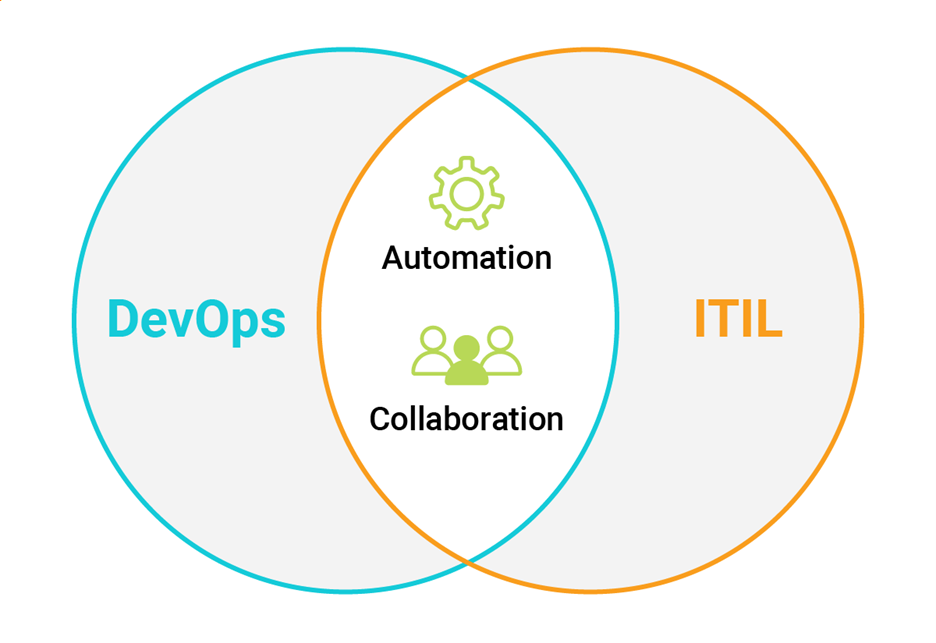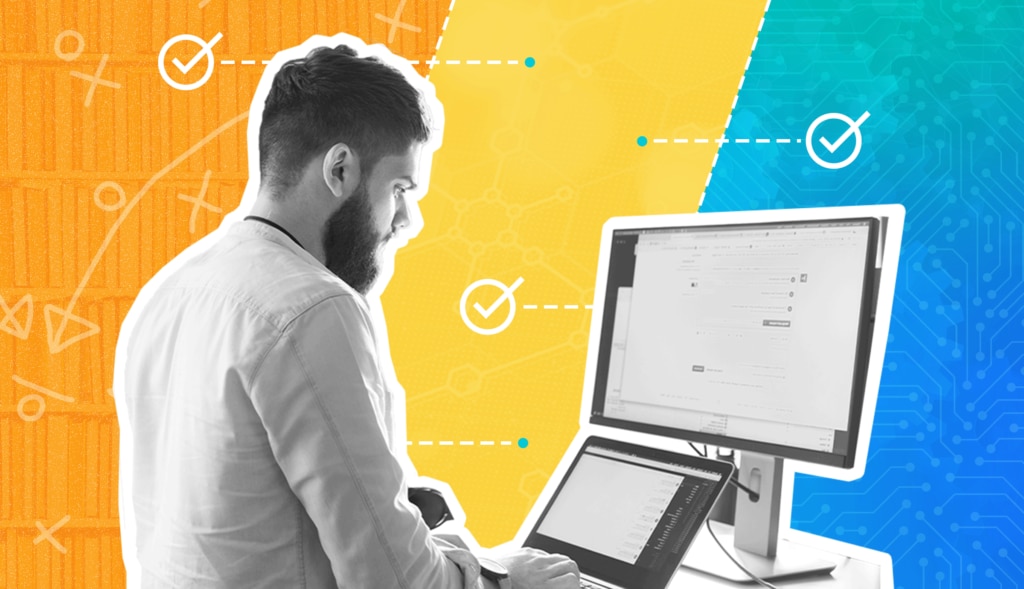Both DevOps and ITIL are two popular frameworks in the IT space and get a lot of attention. However, while both are frameworks, DevOps is more of a collaboration method and shift in thinking vs. ITIL, which is a set of detailed guidelines for IT service management. You can be fairly flexible when it comes to your DevOps implementation in your organization, ITIL is more rigid, with very prescriptive guidance necessary for it to earn the label of ITIL.
There are many misconceptions about ITIL vs. DevOps, including how they can work together. In this post, I’ll cover what DevOps and ITIL are at a high level, the differences you should know about, and why DevOps and ITIL can be very powerful when combined to drive business results for an organization.
What is DevOps? Simple Definition
DevOps combines software development teams and operations teams to drive the acceleration of software development. DevOps is really a mindset designed to get these two teams, which have traditionally operated separately, to collaborate.
This siloed past meant developers grew frustrated at the slow response times from operations teams, while the operations teams felt overwhelmed by the seemingly endless requests from developers. It was a fragile, often unproductive, environment in which to get work done.
DevOps breaks down those silos, focusing instead on problem solving via cross-team collaboration. DevOps is often implemented through cross-functional collaboration on different software products, depending on what the organization is using at the time. Implementing\
DevOps methodologies is also a great time for organizations to evaluate their current tooling and see what can be improved upon. Here are some other
important DevOps benefits to consider.
One big part of DevOps is continuous integration/continuous delivery, also known as CI/CD. CI/CD is the end-to-end processes performed to develop the software, with a strong focus on automation.
You can learn more about
what DevOps is in this comprehensive guide.
What is ITIL? Basic Overview
Information Technology Infrastructure Library (ITIL) has been the gold standard when it comes to IT services best practices. The focus of ITIL is on the users themselves instead of the technology. It’s been widely credited with revolutionizing IT operations.
ITIL, especially in its newest iteration,
ITIL v4 , is all about breaking down silos and focusing on cross-functional collaboration for better outcomes. The guiding principles of this framework focus on incident management, problem management, change management, and release management.
Fun fact: ITIL was originally a library. The first IT certification I got when I started my career was the ITIL certification, and at that point it was a series of multi-colored books everyone kept on a shelf. It’s come a long way! You can read more about the evolution of ITIL here.
DevOps was added to the framework with ITIL 4. Despite these improvements, there still exists a common misconception that ITIL can be difficult to implement, bringing with it a great deal of operational overhead. The truth is that with the right tools and stakeholders,
ITIL can be implemented very smoothly and bring tremendous value to organizations.
What’s the Difference Between ITIL and DevOps?
So, while I’ve defined both DevOps and ITIL at a surface level, what I’d really like to talk about are the key differences between ITIL and DevOps you need to know to be successful and benefit from both.
What Are the Benefits of Using ITIL for DevOps?
The addition of DevOps methodologies in ITIL 4 provides many benefits for common use cases where it makes sense for DevOps to integrate with ITIL. Let’s take a look at some of the ways they can work together in an organization.
 Figure 1 – Benefits of DevOps and ITIL Working Together
Figure 1 – Benefits of DevOps and ITIL Working Together
Automation Everywhere
DevOps can lend many ITIL processes a helping hand by automating tasks like change management and problem management. This is a paradigm shift from the ITIL implementations of years ago, which involved a resource-sapping amount of manual work. Especially in today’s highly complex IT environments, manual work like that doesn’t scale.
Cultural AdaptationDevOps thinking involves a rethinking of the “siloed” mindset, and an openness to collaboration that brings tremendous business value to any organization. It’s all about uniting people, processes, and products. This works well with ITIL processes, since ITIL 4 recognizes that no change, service, or policy has a one-size-fits-all solution. The natural synergies gained by DevOps lend themselves well to the enhanced management processes in ITIL.
Meeting Stakeholder Requirements
Service-level agreements (SLAs) are important in ITIL, which dovetails perfectly with the DevOps emphasis on streamlining operations. DevOps teams create the automation needed to meet the SLAs required by IT organizations for highly efficient operations.
Why Your Existing Tech Stack May Be Holding You Back
At the heart of ITIL practices and DevOps is the software that makes it happen. It needs to be powerful yet also simple to use, as well as comprehensive. If that sounds like a tall order, you’re right. Be wary of less-complete solutions that won’t bring the level of performance and automation necessary to provide all the advantages the combination of ITIL and DevOps offers.
When you’re looking for software to not only streamline your ITSM processes but also automate common tasks and empower your users to take action, take a look at
SolarWinds® Service Desk. Available as a standalone, ITIL-ready platform in addition to an
integration for SolarWinds Observability Self-Hosted (formerly known as Hybrid Cloud Observability) built to provide the closed-loop management system using automated ticketing, Service Desk can help provide the bridge between quickly identifying what needs to be done and resolving these issues faster.
 Figure 1 – Benefits of DevOps and ITIL Working Together
Figure 1 – Benefits of DevOps and ITIL Working Together








